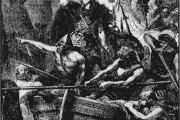Viewings: 5062

In Russia they were called Vikings, in Western Europe - by the Normans, and in them are known as Vikings: fearless sailors, fierce warriors...
While going on a long hikes, Vikings consistently, patiently, the Nordic patience and stubbornness has achieved its goals. Fierce courage, praised the Scandinavian sagas, has created an extraordinary halo, thanks to which in the memory of mankind sailors of the North remained invincible warrior, above all appreciated valor, wealth and fame.
What was the beginning of the epic Viking?
In 789, the Board of the Danish king Beatrice, near the coast of England appeared three ships Danes from Gardaland. The messenger of the king of England came to the place where moored ships, and tried to get seafarers to arrive to their master, but was killed... So the Anglo-Saxon chronicle tells about the first attack and the first victim of the Vikings.
Four years later, in 793, was followed by the much more famous RAID on the monastery British island of Lindisfarne. "The perfidious destruction of the Gentile Church of God were accompanied by looting and bloodshed. Never before Britain did not experience such horror, as now, from the pagan tribe, - the scientist has written Alcuin, - the very thought of invasion from the sea seemed impossible.
So, the Church of St. Cuthbert was covered with blood priests of God and is devoid of almost all of the utensils; the greatest relic of Britain fell victim of the Gentiles."
After the first Viking raids on England in the late eighth century was followed by a forty-year period of relative calm. But in 835 year, says the chronicle, "pagans" destroyed Sheppee. Later there was not a year without raids North of pirates on any part of the country.
Initially, these expeditions were nothing more than predatory raids in search of prey and slaves; but in 850-851 the years there has been a change in the strategy of the Vikings. This year the chronicle notes that "for the first time pagans remained for the winter" on the Isle of Thanet.
In 855-856, the army Vikings again "remained on the whole winter", this time on the island Sheppee; in 864-865 years Vikings again wintered at Tanita; finally, in 865-866, "a huge fleet of the Gentiles", arriving from the continent, have expedition spent the winter there in East Anglia. This time the Vikings arrived to stay...
For the Anglo-Saxons Vikings were "pagans", "Danish" or "of the Northern people". The term "Viking" was hardly used outside Scandinavia (although some scientists have suggested that the word comes from the Saxon wic - a military camp).
Frankish sources called predators from over the sea nordmanni (Northern people, hence the Normans). German historians give them the name ascomanni; the origin of this term is vague. Some scientists believe that mysterious word comes from the Norman names ash ash; of him that was built Viking ships; but in fact most of the Viking ships were made of oak.
Spanish Muslim sources called militant northerners A1-madgus (pagan sorcerers, according to another interpretation - fire-worshippers); Slavic - Rus (perhaps from Rotsi - Finnish names Sweden). The Byzantines knew them as rhos (from the Greek adjective "red", perhaps the Greeks came to mind because of the reddish color of weather-beaten faces of mariners) or varangoi (probably from the old Norse var vow; the Northern warriors was the custom to give each other a vow of devotion). It is obvious that the word varangoi could easily turn into "outsiders"...
Only the Irish, who actually called Viking lochlannach (northerners) or gaill (aliens, strangers), tried to distinguish alien nationality, calling, respectively, Norway finn-gaill - white foreigners, and the Danes - dubh-gaill, black strangers. Chroniclers of other countries used the terms "the Danes, Norwegians and Swedes"as interchangeable.
For example, Adam of Bremen in 1075 writes: "the Danes and Swedes, which we call the Normans..." He also explains that "the Danes, Swedes and other Nations of Denmark (including Norway) called Normans". Therefore, when the Anglo-Saxon chronicle mentions of Vikings from Dene or Dani, it should not be regarded as a proof of their origin it is from Denmark.
The actual origin of the word "Viking" it is impossible to establish with full precision. Constantly growing number of scientists who believe the correct theory of the origin of the term from vic (narrow Bay, fjord, Bay); Viking, they say, is primarily a pirate hiding in a remote Bay.
Other produce the word "Viking" from Vik - geographic name field in Norway or from vig (battle of) - but the latter is unlikely terms of phonology. Still others result as meaning the source, the verb vikja (move, turn away); it is the de characterizes warrior-Viking pass performing combat maneuver. But in the Scandinavian written sources of the word viking in fact refer to the notion of piracy or pirate attack; man, who participated in this attack, called vikingr.
Why so suddenly and spectacularly on the historical stage appeared the Vikings? As one of the major reasons that lead to overcrowding in the country. Indeed, in the VII-VIII centuries on the territory of Scandinavia, or rather, Denmark there was a population explosion.
















